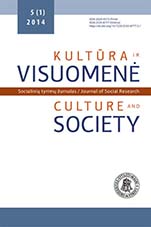„Katalikiškoji dauguma“ Lietuvoje kintančios religinės situacijos kontekste. Religinio pragmatizmo koncepcijos formulavimas
The “Catholic majority” in the context of the changing religious situation in Lithuania. The formulation of the concept of religious pragmatism
Author(s): Aušra PažėraitėSubject(s): Cultural Essay, Political Essay, Societal Essay
Published by: Vytauto Didžiojo Universitetas
Keywords: Naujieji religiniai judėjimai; Romos katalikų bažnyčia; „Kultūriniai“ katalikai; Katalikiškoji dauguma; Religinė hegemonija; Religinis pragmatizmas; Religinė įvairovė; Religinis pasirinkimas; New religious movements; Roman Catholic Church
Summary/Abstract: Straipsnyje keliama šiandien aktuali teorinė religijotyros problema, kaip konceptualizuoti daugelyje šiuolaikinių visuomenių pastebimą įsigalėjusių religijų ir visuomenės santykių ambivalentiškumą, kai, viena vertus, akivaizdus didelės dalies atotrūkis kasdienybėje tarp religinės tapatybės ir praktikos bei tikėjimų, kita vertus, vis atsinaujinantis religijos prestižas ir įtaka. Tarpdisciplininės kritinės diskurso analizės metodu analizuojant viešąjį diskursą Lietuvoje, kai kurių akademinių publikacijų konceptualius siūlymus, kritikuojama normatyvinė perspektyva, kurioje didžioji dauguma katalikiška save laikančios visuomenės yra vertinama per normatyvinę katalikybės (ir bendrai religijos) sampratą, leidžiančią kvestionuoti šios daugumos katalikiškumą, arba, priešingai, priimant katalikišką tapatybę kaip savaime suprantamą dalykų tvarką, kvestionuojama kitokios religijos pasirinkimo egzistencinio apsisprendimo galimybė, kaip ir tuo atveju, kai šitokia nuostata kvestionuojama kaip hegemoniška, bet pasirinkimas konceptualizuojamas per laisvosios rinkos metaforą. In the article an actual theoretical problem in religious studies is posed, such as how should we conceptualise the certain ambivalence of relationships of large societies to religion observed in many modern societies with a significant gap between everyday life and religious identity, practices and beliefs, also between the resurgence in religious prestige and political influence. Analysing the public discourse in Lithuania, some conceptual proposals in Lithuanian academic publications using the method of interdisciplinary critical discourse analysis, the normative perspective in which the catholicity of the vast majority of Catholic society in Lithuania is questioned. Yet upholding the Catholic identity by that majority as a natural order of things, enabling that majority to question the possibility of a serious existential choice of a different religion, is criticized as hegemonic in both cases. In the case of academic criticism of this kind of hegemony, the choice of religion is conceptualized through the free market metaphor. In this article Catholic hegemony in Lithuania is designated through the very identity of that majority of people, and that this hegemonic consciousness enables them in general to maintain their everyday life, beliefs and practices out of the direct reach of existential searching, to maintain their religious indolence, and at the same time to perceive itself as constituting the normative majority. This type of religious attitude is defined here as pragmatic, and pragmatism is defined as maintaining religious identity and belonging to a religious institution for reasons other than existential concerns, including those that provide some social and/or symbolic benefits, and/or additional benefices associated with the ultimate “guarantees”.
Journal: Kultūra ir visuomenė: socialinių tyrimų žurnalas
- Issue Year: V/2014
- Issue No: 1
- Page Range: 45-64
- Page Count: 19
- Language: Lithuanian

